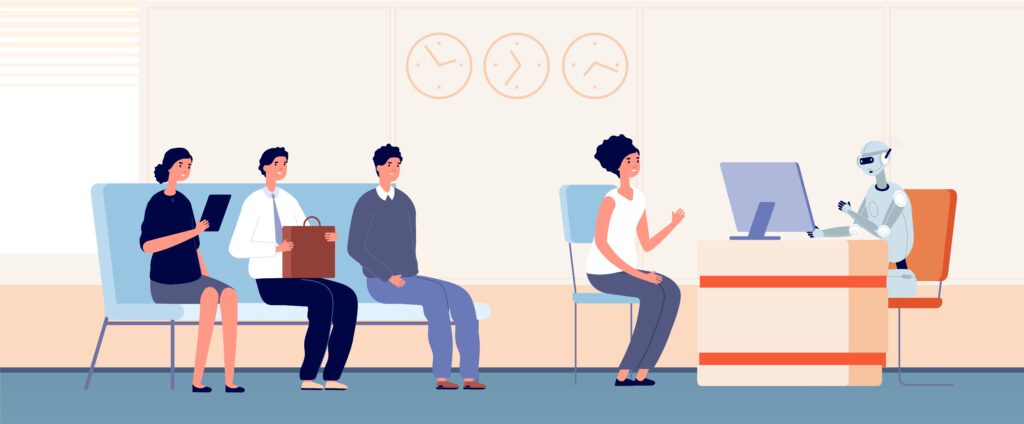
Will AI take over Job Interviews in the future?
“Welcome my son
Welcome to the machine
Where have you been?
It’s alright we know where you’ve been”
Pink Floyd, “Welcome to the machine”, in their 1975 album “Wish You Were Here”
Humans have been fearing the rise of sentient machines for much of the 20th century. Now that we are well and truly in the machine age, it’s somewhat amazing to see how the machines have insinuated themselves into our lives, in ways big and small.
In the context of recruiting for jobs, the role of Artificial Intelligence (AI) can best be described as ‘Rising and Rising’. From taking over monotonous, repetitive jobs and time consuming tasks, AI engines are powering modern-day recruitment platforms in supporting decision making and data analytics.
However, will this rise of the machines include AI taking over actual job interviews as well? Can we expect to talk to AI, particularly in today’s virtual interviews, before we get a job offer? The notion of Artificial Intelligence in interviews seems daunting, even dystopian to many. Let us parse the tea leaves to understand AI-powered virtual interviews better.

Will AI Take Over Job Interviews?
What makes for successful interviews? On the part of the interviewee, it involves adequate preparation with regard to the role being interviewed for. This could mean research on the company, revision of possible technical/functional areas the person will be interviewed in, and preparation with the right attire and logistics for the interview.
For the interviewing team, interviews form the crux of the recruitment process. From filtering for the must-have criteria via the initial interview rounds to determining technical and functional skills as well as cultural fit in later rounds, interviews help hiring teams find the best fit for their open roles.
A high-level review of the interviewing process shows many areas where AI can assist the hiring team in the process, particularly the repetitive, ‘codable’ parts that operate within measurable constraints.
Here are some tasks that AI can take on:
- Optimise initial filtering interviews: Instead of person-to-person ‘top of the funnel’ rounds, which can consume many cycles in terms of logistics and time, recruiters can ask candidates to send in short video responses to pre-set questions.
AI is employed in this round to do facial analysis of the videos submitted to screen candidates. Criteria such as word choice and intonation can be set to gauge the candidates’ suitability for the next round.
- Provide convenience to interviewees and interviewers: The advantage of such AI-driven filtering? Candidates can login at their own convenience and finish these rounds. Some platforms offer candidates ‘practice rounds’ so that they submit their best videos for consideration.
The benefit for the interviewing company? Scale! One AI interviewer bot can potentially pare down among 20,000 candidates with such filtering rounds for a role with many applicants. - Conduct online coding assessments: Now considered a common tool to filter candidates, online coding tests and hackathons driven by AI engines are a surefire way to assess the problem solving and analytical skills of candidates, not to mention their knowledge of programming languages and APIs.
- Reduce human interviewer bias: Although AI systems have been found to be vulnerable to bias, primarily due to the bias inherent in their training data sets, recruiters have found that using AI can help lessen discrimination by human interviewers.
- Provide feedback to candidates: With AI powered virtual interview rounds, candidates can get personalized feedback on their performance instantly as well as coaching tips for improvement. This is something harried human interviewers may not have the bandwidth to do, particularly when undertaking high-volume hiring.
Leading recruitment platforms including HirePro’s AI powered virtual interview platform offer many of these features. These can help to immensely reduce the time recruiting teams spend on sourcing and screening candidates, particularly high-volume, low-skill roles.
Even for many high-skill roles, the platforms remove the need to waste HR professionals’ precious time, especially during the initial rounds. The repetitive nature of screening rounds make them an apt fit for being conducted by AI. The HR team can step in to support and close in the final interviews after the hiring managers have made their decisions and given their inputs about technical and functional skills.
In a nutshell, that ‘interview with a machine’ that you and I were apprehensive about is already happening. It is not as fearful as the drum beaters make it sound. In fact, the converse is true: AI powered interviews can bring a wealth of productivity and efficiency to the recruitment process. What is undeniable is that AI powered interviews are here to stay, and recruitment specialists couldn’t be happier about it.